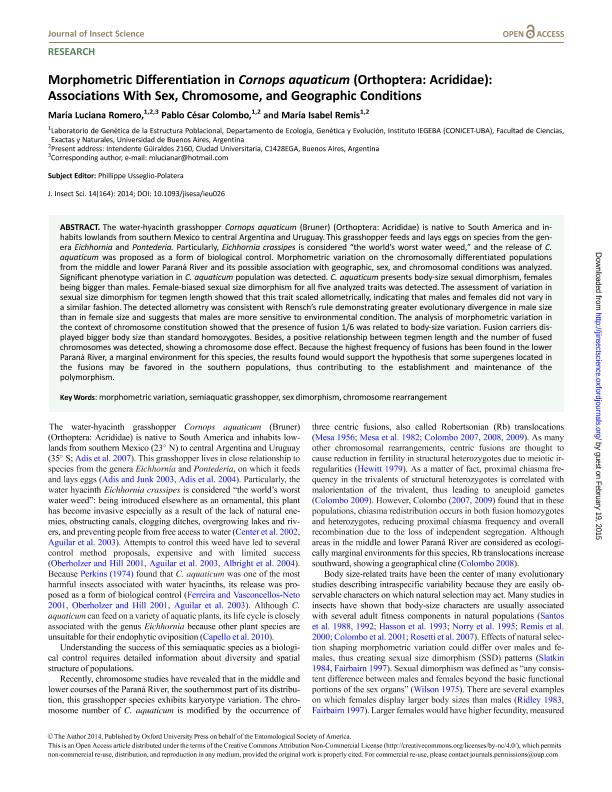Mostrar el registro sencillo del ítem
dc.contributor.author
Romero, Maria Luciana

dc.contributor.author
Colombo, Pablo Cesar

dc.contributor.author
Remis, Maria Isabel

dc.date.available
2017-07-05T20:42:54Z
dc.date.issued
2014-11
dc.identifier.citation
Romero, Maria Luciana; Colombo, Pablo Cesar; Remis, Maria Isabel; Morphometric differentiation in Cornops Aquaticum (Orthoptera: Acrididae): associations with sex, chromosome, and geographic conditions; Oxford University Press; Journal of Insect Science; 14; 1; 11-2014; 1-8
dc.identifier.uri
http://hdl.handle.net/11336/19697
dc.description.abstract
The water-hyacinth grasshopper Cornops aquaticum (Bruner) (Orthoptera: Acrididae) is native to South America and inhabits lowlands from southern Mexico to central Argentina and Uruguay. This grasshopper feeds and lays eggs on species from the genera Eichhornia and Pontederia. Particularly, Eichhornia crassipes is considered “the world’s worst water weed,” and the release of C. aquaticum was proposed as a form of biological control. Morphometric variation on the chromosomally differentiated populations from the middle and lower Parana´ River and its possible association with geographic, sex, and chromosomal conditions was analyzed. Significant phenotype variation in C. aquaticum population was detected. C. aquaticum presents body-size sexual dimorphism, females being bigger than males. Female-biased sexual size dimorphism for all five analyzed traits was detected. The assessment of variation in sexual size dimorphism for tegmen length showed that this trait scaled allometrically, indicating that males and females did not vary in a similar fashion. The detected allometry was consistent with Rensch’s rule demonstrating greater evolutionary divergence in male size than in female size and suggests that males are more sensitive to environmental condition. The analysis of morphometric variation in the context of chromosome constitution showed that the presence of fusion 1/6 was related to body-size variation. Fusion carriers displayed bigger body size than standard homozygotes. Besides, a positive relationship between tegmen length and the number of fused chromosomes was detected, showing a chromosome dose effect. Because the highest frequency of fusions has been found in the lower Parana´ River, a marginal environment for this species, the results found would support the hypothesis that some supergenes located in the fusions may be favored in the southern populations, thus contributing to the establishment and maintenance of the polymorphism.
dc.format
application/pdf
dc.language.iso
eng
dc.publisher
Oxford University Press

dc.rights
info:eu-repo/semantics/openAccess
dc.rights.uri
https://creativecommons.org/licenses/by-nc-sa/2.5/ar/
dc.subject
Morphometric Variation
dc.subject
Semiaquatic Grasshopper
dc.subject
Sex Dimorphism
dc.subject
Chromosome Rearrangement
dc.subject.classification
Genética y Herencia

dc.subject.classification
Ciencias Biológicas

dc.subject.classification
CIENCIAS NATURALES Y EXACTAS

dc.title
Morphometric differentiation in Cornops Aquaticum (Orthoptera: Acrididae): associations with sex, chromosome, and geographic conditions
dc.type
info:eu-repo/semantics/article
dc.type
info:ar-repo/semantics/artículo
dc.type
info:eu-repo/semantics/publishedVersion
dc.date.updated
2017-07-05T15:02:33Z
dc.identifier.eissn
1536-2442
dc.journal.volume
14
dc.journal.number
1
dc.journal.pagination
1-8
dc.journal.pais
Reino Unido

dc.journal.ciudad
Oxford
dc.description.fil
Fil: Romero, Maria Luciana. Consejo Nacional de Investigaciones Científicas y Técnicas. Oficina de Coordinación Administrativa Ciudad Universitaria. Instituto de Ecología, Genética y Evolución de Buenos Aires. Universidad de Buenos Aires. Facultad de Ciencias Exactas y Naturales. Instituto de Ecología, Genética y Evolución de Buenos Aires; Argentina
dc.description.fil
Fil: Colombo, Pablo Cesar. Consejo Nacional de Investigaciones Científicas y Técnicas. Oficina de Coordinación Administrativa Ciudad Universitaria. Instituto de Ecología, Genética y Evolución de Buenos Aires. Universidad de Buenos Aires. Facultad de Ciencias Exactas y Naturales. Instituto de Ecología, Genética y Evolución de Buenos Aires; Argentina
dc.description.fil
Fil: Remis, Maria Isabel. Consejo Nacional de Investigaciones Científicas y Técnicas. Oficina de Coordinación Administrativa Ciudad Universitaria. Instituto de Ecología, Genética y Evolución de Buenos Aires. Universidad de Buenos Aires. Facultad de Ciencias Exactas y Naturales. Instituto de Ecología, Genética y Evolución de Buenos Aires; Argentina
dc.journal.title
Journal of Insect Science

dc.relation.alternativeid
info:eu-repo/semantics/altIdentifier/doi/http://dx.doi.org/10.1093/jisesa/ieu026
dc.relation.alternativeid
info:eu-repo/semantics/altIdentifier/url/https://academic.oup.com/jinsectscience/article-lookup/doi/10.1093/jisesa/ieu026
Archivos asociados
